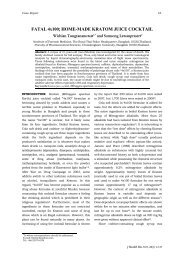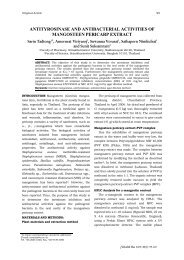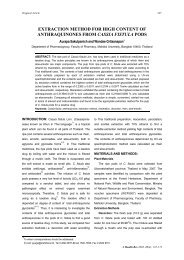Assessment of Knowledge, Attitude, and Practice Regarding Malaria
Assessment of Knowledge, Attitude, and Practice Regarding Malaria
Assessment of Knowledge, Attitude, and Practice Regarding Malaria
Create successful ePaper yourself
Turn your PDF publications into a flip-book with our unique Google optimized e-Paper software.
Short Report 195<br />
ASSESSMENT OF KNOWLEDGE, ATTITUDE, AND PRACTICE<br />
REGARDING MALARIA PREVENTION TOWARDS<br />
KAREN ETHNIC GROUP IN UMPIEM MAI REFUGEE CAMP,<br />
PHOBPHRA DISTRICT, TAK PROVINCE<br />
Wahwahpaw Phensaengngam 1 Pongchai Harnyuttanakorn 1,2 <strong>and</strong> Naowarat Kanchanakhan 1,∗<br />
1 College <strong>of</strong> Public Health Sciences, Chulalongkorn University, Bangkok 10330<br />
2 Department <strong>of</strong> Biology, Faculty <strong>of</strong> Science, Chulalongkorn University, Bangkok 10330<br />
ABSTRACT: A cross-sectional study was conducted on 17 - 28 March 2008 to assess the current<br />
state <strong>of</strong> knowledge, attitude, <strong>and</strong> practice (KAP) regarding malaria prevention towards Karen ethnic<br />
group in Umpiem Mai refugee camp, Phobphra District, Tak Province. Three hundred seventy nine<br />
subjects age 15-60 were recruited in this study <strong>and</strong> a structured questionnaire was used to gathers<br />
the data. Chi-square was used to analyze association between independent <strong>and</strong> dependent variables.<br />
The result shows that 61.7% <strong>of</strong> respondents had good knowledge, 40.1% had good attitude while only<br />
1% had good practice regarding malaria prevention. The study reveals that education, total family<br />
income <strong>and</strong> receiving information about malaria are significant associate with knowledge (p = 0.019, p<br />
= 0.021 <strong>and</strong> p = 0.005 respectively), highly significant association between education <strong>and</strong> attitude (p<br />
196 Short Report<br />
RESULTS: The study population included 379<br />
respondents whose characteristics were summarized in<br />
Table 1. The level <strong>of</strong> respondents’ knowledge, attitude<br />
<strong>and</strong> practice regarding malaria prevention were shown<br />
in Table 2. Respondents' knowledge, attitude <strong>and</strong><br />
practice were classified in 3 levels, "good, moderate<br />
<strong>and</strong> poor". The cut-<strong>of</strong>f point for "Good" is greater than<br />
80% <strong>of</strong> total scores, "Moderate" is 60% to 80% <strong>of</strong> total<br />
scores <strong>and</strong> "Poor" is less than 60% <strong>of</strong> total scores.<br />
Although 61.7% <strong>of</strong> respondents had good knowledge<br />
<strong>and</strong> 40.1% had good attitude <strong>and</strong> among 199<br />
respondents only 1% had good practice towards<br />
malaria. When looking in detail on malaria knowledge,<br />
one-fourth <strong>of</strong> them had poor knowledge on malaria<br />
vector. About 10% <strong>of</strong> the respondents had good<br />
Table 1 Characteristics <strong>of</strong> the respondents (n=379)<br />
Number (%)<br />
Age<br />
15 - 20 68 17.9<br />
21 - 30 131 34.6<br />
31 - 40 113 29.8<br />
41 - 60 67 17.7<br />
Mean = 30.6, SD = 9.2 Range = 15 - 57<br />
Gender<br />
Male 128 33.8<br />
Female 251 66.2<br />
Marital Status<br />
Single 95 25.1<br />
Married 269 71.0<br />
Divorced + Widowed 15 3.9<br />
Education<br />
Never attend school 109 28.8<br />
Primary school 102 26.9<br />
Secondary school 73 19.3<br />
High school + College/University 87 23.0<br />
Other 8 2.1<br />
Occupation<br />
Housewife 183 48.3<br />
Teacher + Health personnel 51 13.4<br />
Small shop owner + Vender 15 4.0<br />
Plantation + Water supplier 4 1.0<br />
Daily wages 60 15.8<br />
Other 66 17.4<br />
Monthly family income (Baht)<br />
3000 12 3.2<br />
Median = 500, Range = 0 – 5,500 Baht<br />
J Health Res 2008, 22(4): 195-198<br />
Table 2 Level <strong>of</strong> <strong>Knowledge</strong>, attitude <strong>and</strong> practice on malaria<br />
prevention<br />
Item<br />
Percentage<br />
Good Moderate Poor<br />
Overall knowledge <strong>of</strong> malaria 61.7 36.7 1.6<br />
(n=379)<br />
Level <strong>of</strong> attitude (n=379) 40.1 58.3 1.6<br />
Level <strong>of</strong> practice (n=199) 1.0 12.6 86.4<br />
knowledge on malaria transmission <strong>and</strong> symptoms.<br />
<strong>Regarding</strong> to practice, respondents had good practice<br />
related to bed net (85% always sleep in bed net <strong>and</strong> all<br />
family member sleep in bed net (80%). Concerning<br />
practices on mosquito repellent (coil, in-door/out-door<br />
spray) very few percentages <strong>of</strong> respondents (0.3%)<br />
practice regularly. Most <strong>of</strong> them (73.6%) always wear<br />
long-sleeve cloth when stay outside at night time.<br />
However, only 5.5% take bed net when they go to the<br />
forest (table 3).<br />
Number (%)<br />
Duration stay in refugee camp<br />
5 years<br />
Total family member<br />
349 92.1<br />
1 – 2 24 6.3<br />
3 – 5 193 50.9<br />
6 - 8 138 36.4<br />
9 – 14<br />
Mean = 2.44, SD = 0.730<br />
Received information about malaria<br />
24 6.3<br />
Yes 345 91.0<br />
No<br />
Source <strong>of</strong> Information**<br />
34 9.0<br />
Hospital 112 32.5<br />
Home (Family member) 35 10.1<br />
Community health worker 306 88.7<br />
Community head leader 6 1.7<br />
Neighbor 30 8.7<br />
Drug vender 2 0.5<br />
Traditional healer 2 0.5<br />
Other<br />
Family members suffered from malaria<br />
14 4.05<br />
Yes 53 14.0<br />
No<br />
Place <strong>of</strong> infected (n=53)<br />
326 86.0<br />
Outside camp 39 73.6<br />
Inside camp 14 26.4<br />
Source <strong>of</strong> healthcare family seeking for treatment (n=53)<br />
Hospital 52 98.1<br />
Other<br />
** Multiple responses allowed<br />
1 1.9
Short Report 197<br />
Table 3 <strong>Practice</strong> towards malaria prevention<br />
<strong>Practice</strong> towards malaria prevention (n=379)<br />
Sleep in mosquito net<br />
Check the hole on bed net<br />
Immediately repair the net<br />
Use impregnated bed net<br />
All family members sleep in bet net<br />
Use mosquito repellent coil at night time<br />
Use repellent to prevent yourself from mosquito bite<br />
Use indoor anti-mosquito spray in your house<br />
Use outdoor anti-mosquito spray for your house<br />
Wear long-sleeve cloth when stay outside at night time<br />
Clean the bushes around your house<br />
Clean the stagnant water near your house<br />
Put oil in to the stagnant water<br />
Clear the dark corner in your house<br />
Take bed net when you go to the forest<br />
Go to hospital when you think you have malaria<br />
*Non-applicable means not available or inaccessible.<br />
Always<br />
N (%)<br />
321 (84.7)<br />
289 (76.3)<br />
255 (67.3)<br />
94 (24.8)<br />
302 (79.7)<br />
1 (0.3)<br />
1 (0.3)<br />
1 (0.3)<br />
8 (2.1)<br />
279 (73.6)<br />
203 (53.6)<br />
183 (48.3)<br />
12 (3.2)<br />
211 (58.3)<br />
21 (5.5)<br />
327 (86.3)<br />
Sometimes<br />
N (%)<br />
42 (11.1)<br />
69 (18.2)<br />
94 (24.8)<br />
42 (11.1)<br />
53 (14.0)<br />
25 (6.6)<br />
17 (4.5)<br />
10 (2.6)<br />
37 (9.8)<br />
96 (25.3)<br />
174 (45.9)<br />
175 (46.2)<br />
36 (9.5)<br />
147 (38.8)<br />
11 (2.9)<br />
45 (11.9)<br />
Never<br />
N (%)<br />
10 (2.6)<br />
17 (4.5)<br />
26 (6.9)<br />
233 (61.5)<br />
23 (6.1)<br />
275 (72.6)<br />
282 (74.4)<br />
289 (76.3)<br />
276 (72.8)<br />
4 (1.1)<br />
2 (0.5)<br />
20 (5.3)<br />
316 (83.4)<br />
9 (2.4)<br />
236 (62.3)<br />
5 (1.3)<br />
Non-applicable*<br />
N (%)<br />
6 (1.6)<br />
4 (1.1)<br />
4 (1.1)<br />
10 (2.6)<br />
1 (0.3)<br />
78 (20.6)<br />
79 (20.8)<br />
79 (20.8)<br />
58 (15.3)<br />
0 (0)<br />
0 (0)<br />
1 (0.3)<br />
15 (4.0)<br />
2 (0.5)<br />
111 (29.3)<br />
2 (0.5)<br />
Table 4 Association between characteristics <strong>and</strong> attitude, knowledge <strong>and</strong> practice<br />
Characteristics<br />
Education<br />
N<br />
<strong>Attitude</strong> N (%)<br />
Good Moderate & Poor<br />
a<br />
Never attend school + Other<br />
Primary school + Secondary school<br />
High school + College/University<br />
Characteristics<br />
Education<br />
117<br />
175<br />
87<br />
N<br />
37 (31.6) 80 (68.4)<br />
63 (36.0) 112 (64.0)<br />
52 (59.8) 35 (40.2)<br />
<strong>Knowledge</strong> N (%)<br />
Good Moderate & Poor<br />
b<br />
Never attend school + Other<br />
Primary school + Secondary school<br />
High school + College/University<br />
Total family income (Baht/month)<br />
117<br />
175<br />
87<br />
60 (51.3) 57 (48.7)<br />
115 (65.7) 60 (34.3)<br />
59 (67.8) 28 (32.2)<br />
c<br />
< 500<br />
500 – 1000<br />
> 1000<br />
Received <strong>and</strong> heard information about malaria<br />
150<br />
177<br />
52<br />
81 (54.0) 69 (46.0)<br />
122 (68.9) 55 (31.1)<br />
31(59.6) 21 (40.4)<br />
d<br />
Yes<br />
No<br />
Characteristics<br />
Total family income (Baht/month)<br />
345<br />
34<br />
N<br />
211 (64.1) 124 (35.9)<br />
13 (38.2) 21 (61.8)<br />
<strong>Practice</strong> N (%)<br />
Good & Moderate Need for improvement<br />
a<br />
< 500<br />
500 – 1000<br />
> 1000<br />
Have you ever suffered from malaria<br />
92<br />
87<br />
20<br />
14 (15.2) 78 (84.8)<br />
40 (46.0) 47 (54.0)<br />
12(60.0) 8 (40.0)<br />
e<br />
Yes<br />
No<br />
a b c d e<br />
p=
198 Short Report<br />
received information about malaria tend to have more<br />
knowledge than those who never heard the information<br />
(p=0.005). It was found that percentage <strong>of</strong> good <strong>and</strong><br />
moderate practice was higher in respondent group with<br />
total family income greater than 1000 baht per month<br />
than who family earn less than 500 baht per month<br />
(p=







